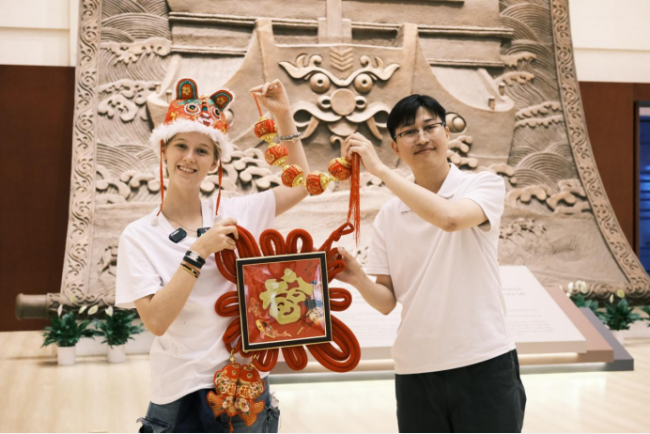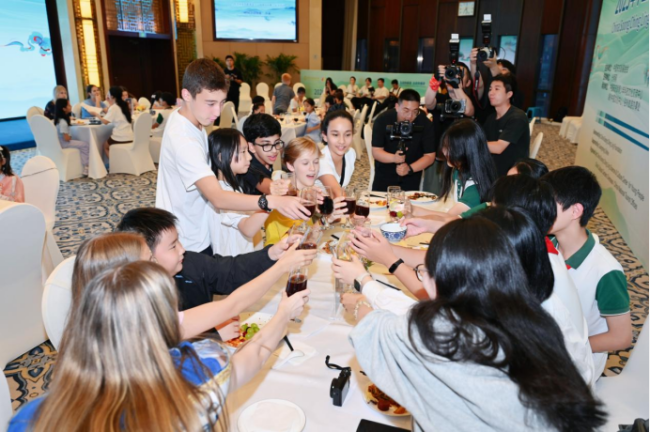
编者按:食物是跨越时空的文化密码,承载着人类共通的情感记忆。当来自不同国家的青少年围坐一桌,当不同的语言因“好吃”而达成共识配资平台排行,文化的隔阂在碗筷碰撞间悄然消融。在由中国宋庆龄基金会主办的“文化小大使”国际交流活动中,来自世界各地的青年食客们,正通过对味觉的探索走进中外文化沟通交流的新时刻。中华网《青衿问道,文脉传承》栏目组将镜头对准这些“食刻”,记录下文明交流互鉴的温情瞬间。
提到最爱的中国美食,美国女孩娜娜(Clementina Coolidge Deane)的眼睛一下亮了起来,“是包子!”她毫不犹豫地答道。在美食专题体验活动中,娜娜还亲手制作了香菇油菜包子。“我一般不喜欢香菇,因为我觉得它吃起来很像橡皮,”她笑着说,“但是在中国的包子里面,我觉得它真的很好吃。”

图为娜娜在采访结束后与主持人的合照
马达加斯加的涂妮(Remamy Larenah Tony)第一次在中国吃到了饺子。饺子丰富的馅料让她惊叹不已,她也因此萌生了亲手包饺子的想法。这份心愿,是涂妮主动走进并拥抱中国文化的最好体现。

图为涂妮和娜娜在对外经贸大学
白俄罗斯的塔莎(ШаховаТаисияАлексеевна)则在最喜欢的中国食物上给出了不同于大多数人的答案——小葱拌豆腐。她已经学会了烹饪这道美食,并且希望在此次中国之行后,学会更多更复杂的中国菜肴。

图为塔莎接受采访现场
在品味中国美食的过程中,“文化小大使”不仅通过个人的味觉体验对中国饮食文化产生了浓厚兴趣,也开始尝试着用自己的方式理解和诠释中国文化。他们的分享超越了单纯的口感评价,成为一种鲜活的文化对话。在品尝与交流中,“小大使”逐渐领悟到食物背后深厚的历史文化内涵。虽然每个人的感受不尽相同,但正是这些差异与共鸣的交织,让跨文化交流变得更加丰富而生动。
在活动中,“小大使”们交流了彼此对中国美食的看法,分享了本国美食与中国美食的差异。来自白俄罗斯的萨沙(Vasileuskaya Aliaksandra)介绍说,她很喜欢北京烤鸭。并且,相较于白俄罗斯偏甜的点心,中国点心的风味更加丰富。因此,她很想把这些美味介绍给家乡的朋友。


涂妮和娜娜都对比了中国的“辣”与家乡的“辣”,坦桑尼亚的阿迪力(Adil Ally Ahemd)和白俄罗斯的Hanna则不约而同地表达了对中国火锅的喜爱。

图为Hanna在中国印象·沙龙活动现场
当来自世界各地的文化小大使们围坐一桌,面对色香味俱全的中国美食时,一场跨越国界的对话就此展开。在品尝与交流的过程中,美食化身为无声的使者,让有着不同文化背景的人们在味蕾的共鸣中拉近距离,创造共同的记忆片段。在这一时刻,美食作为文化对话的媒介,让参与者在轻松的氛围中获得了对中国文化更具象的理解。

图为中国宋庆龄基金会“文化小大使”中国印象·沙龙活动现场
中国美食为“文化小大使”带来了难忘的味觉体验,也将他们带入情感共鸣的时刻。中国的饺子让Hanna想到故乡的佩尔梅尼(传统白俄罗斯饺子),包饺子、粽子的环节则让14岁的西班牙少年林米阳(Lin Sanchez Barba Millan)回想起他和妈妈一起在厨房忙碌的时光。林米阳在采访中分享了他和妈妈共同制作传统中华美食的经历:“我的妈妈也是中国人,她教会我包粽子和小笼包。”

图为林米阳与家人的合照
在异国的厨房里,海外同胞与他们的子女一起烹饪,在烟火气中编织出一条跨越地理阻隔与代际鸿沟的文化传承纽带。这种以味觉为媒介、以手艺为载体的家庭互动,不仅复刻了记忆中的家乡味道,更在每一次的揉捏和蒸煮中将中华文化的基因悄然植入下一代的成长记忆,使遍布世界的华人后代在蒸腾的热气间触摸到跨越千山万水的文化根脉。
饮食作为文明的活态传承,承载着一个民族独特的历史记忆、生活方式与精神追求。“小大使”以“食客”这一特殊身份进入中外交流的“时刻”,在跨文化对话中进行文化分享与文化感知。当他们品尝一道道中国传统菜肴时,不仅是在感受食物本身的味道,更是在体悟千百年来中国人“民以食为天”的生活哲学。这种以味觉为纽带的交流方式,将抽象的文化差异转化为可感知的情感共鸣,让年轻一代在享受美食的过程中,自然而然地建立起对中国文化的理解与认同。

图为中国宋庆龄基金会“文化小大使”中国印象·沙龙活动现场
在文明交流互鉴的时代命题里,语言可以有隔阂,理念可以有差异,但真正的好味道从不需要翻译。那些留在指尖的美食气息,将成为他们记忆里最生动的世界地图。我们欣喜地看到,那些餐桌上的小“食客”,正逐渐成长为跨文化交流的小使者。他们用味觉丈量文明的广度,用心灵感知文化的深度。期待在未来,有更多这样的“食刻”,让世界青年在享受美食的过程中构建文化认同,为文明交流互鉴注入新的时代内涵。

图为中国宋庆龄基金会“文化小大使”中国印象·沙龙活动现场
"Food Moments" with "Foodies": The Gentlest Way to Initiate Cross-Cultural Dialogue
Editor's Note: Food is a cultural code that transcends time and carries shared human emotional memories. When teenagers from different countries gather around a table, and different languages find common ground in the word "delicious," cultural barriers quietly melt away with the clinking of bowls and chopsticks. In the Junior Cultural Ambassadors international exchange event, hosted by the China Soong Ching Ling Foundation, young food enthusiasts from around the world are embarking on a new chapter of communication and exchange through their exploration of taste. China.com's Inquiring Youth, Inheriting Culture(青衿问道,文脉传承)column focuses its lens on these "food moments," capturing heartwarming instances of cultural exchange and mutual learning.
When asked about her favorite Chinese food, American girl Clementina Coolidge Deane's eyes immediately lit up. "It's baozi!" she answered without hesitation. During the special food experience activity, Nana also personally made shiitake mushroom and bok choy baozi(香菇油菜包子). "I usually don't like shiitake mushrooms because I think they taste like rubber," she said with a smile, "but in Chinese baozi, I think they are really delicious."
Remamy Larenah Tony from Madagascar tasted dumplings for the first time in China. The rich fillings of the dumplings amazed her, and this sparked her desire to make dumplings herself. This wish is the best embodiment of Tony actively embracing Chinese culture.
Шахова Таисия Алексеевна from Russia gave a different answer than most when it came to her favorite Chinese food: "scallions mixed with tofu(小葱拌豆腐)." She has already learned to cook this dish and hopes to learn more complex Chinese dishes after her trip to China.
In the process of savoring Chinese cuisine, the Junior Cultural Ambassadors not only developed a strong interest in Chinese food culture through their personal taste experiences, but also began to try to understand and interpret Chinese culture in their own ways. Their sharing went beyond simple taste evaluations, becoming a vibrant cultural dialogue. Through tasting and communication, the "Junior Ambassadors" gradually came to understand the profound historical and cultural connotations behind the food. Although everyone's feelings were not exactly the same, it was the interweaving of these differences and commonalities that made cross-cultural exchange richer and more vivid.
During the event, the "Junior Ambassadors" exchanged their views on Chinese cuisine and shared the differences between their national foods and Chinese food. Aliaksandra Vasileuskaya from Belarus mentioned that she really likes Peking duck. She also noted that compared to the sweeter desserts in Belarus, Chinese desserts have a richer variety of flavors. Therefore, she really wants to introduce these delicacies to her friends back home.
Both Tony and Nana compared the "spicy" in China with the "spicy" in their hometowns, while Adil Ally Ahemd from Tanzania and Hanna from Belarus both expressed their fondness for Chinese hotpot.
When Junior Cultural Ambassadors from all over the world sat around a table, facing the colorful, aromatic, and delicious Chinese cuisine, a cross-border dialogue began. In the process of tasting and communicating, food transformed into a silent messenger, bringing people from different cultural backgrounds closer through the resonance of their taste buds and creating shared memories. At this moment, food, as a medium for cultural dialogue, allowed participants to gain a more concrete understanding of Chinese culture in a relaxed atmosphere.
Chinese cuisine brought unforgettable taste experiences to the Junior Cultural Ambassadors and led them to moments of emotional resonance. Chinese dumplings reminded Hanna of her homeland's pelmeni (traditional Belarusian dumplings). The process of making dumplings and zongzi reminded 14-year-old Spanish teenager Lin Sanchez Barba Millan of the time he spent busy in the kitchen with his mother. Lin Mi-yang shared his experience of making traditional Chinese food with his mother in the interview: "My mother is also Chinese, and she taught me how to make zongzi and xiao long bao."
In foreign kitchens, overseas compatriots and their children cook together, weaving a cultural inheritance bond that spans geographical barriers and generational gaps in the warmth of home cooking. This family interaction, with taste as the medium and craftsmanship as the carrier, not only recreates the taste of home from memory but also subtly implants the genes of Chinese culture into the growth memories of the next generation with each kneading and steaming. This allows Chinese descendants around the world to touch their cultural roots, which have traveled thousands of mountains and rivers, amidst the rising steam.
As a living heritage of civilization, diet carries a nation's unique historical memory, lifestyle, and spiritual pursuits. The "Junior Ambassadors" entered the "moment" of Sino-foreign exchange as "foodies," engaging in cultural sharing and cultural perception through cross-cultural dialogue. When they taste traditional Chinese dishes, they are not only experiencing the taste of the food itself but also understanding the Chinese philosophy of "food is the primary need of the people" that has existed for thousands of years. This form of exchange, with taste as its bond, transforms abstract cultural differences into tangible emotional resonances, allowing the younger generation to naturally build an understanding and identification with Chinese culture while enjoying food.
In the contemporary era of cultural exchange and mutual learning配资平台排行, there can be language barriers and conceptual differences, but truly good taste never needs translation. The aroma of food lingering at their fingertips will become the most vivid world map in their memories. We are delighted to see that these small "foodies" at the dining table are gradually growing into little ambassadors of cross-cultural exchange. They measure the breadth of civilization with their taste buds and perceive the depth of culture with their hearts. We look forward to more such "food moments" in the future, allowing young people around the world to build cultural identity through enjoying food and injecting new contemporary connotations into cultural exchange and mutual learning.
同花顺配资提示:文章来自网络,不代表本站观点。


